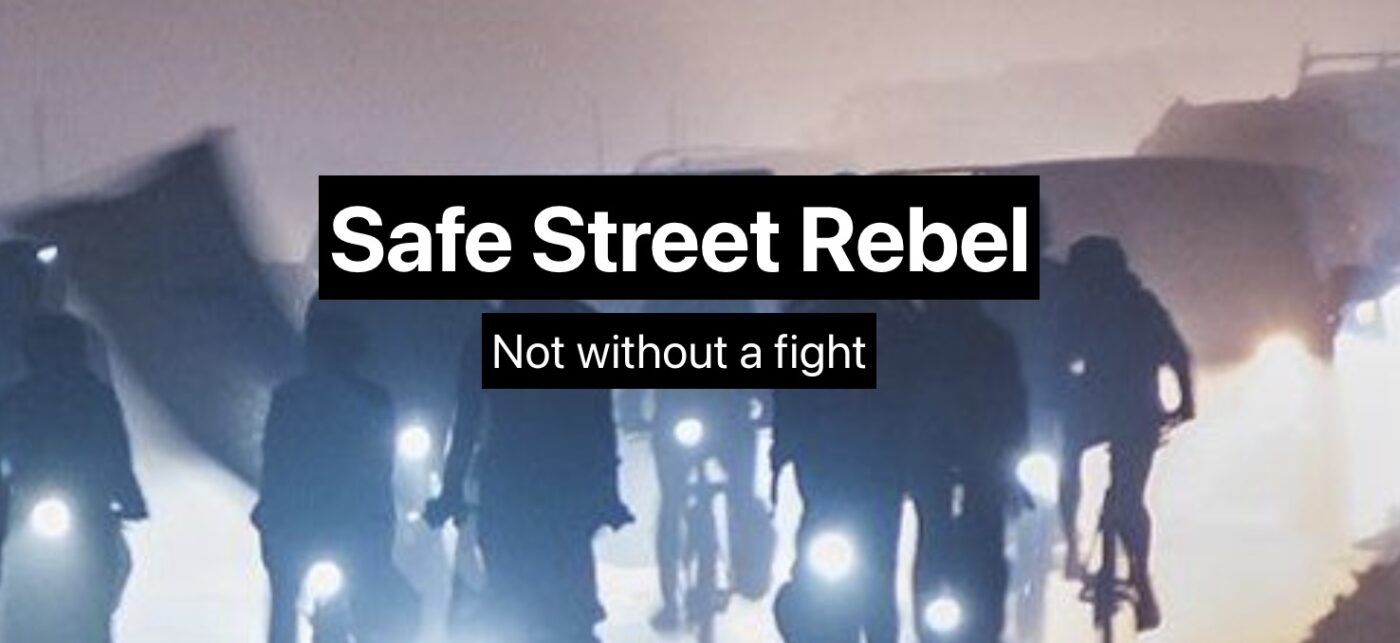I was surprised to bump into a volunteer from Safe Street Rebel (note: story updated 7/31/24 to keep person anonymous at their request) at the Vision Zero Cities Conference this morning. Given that the volunteer was listed as “anonymous” on a panel yesterday, and identifiable only by the name of the group they organize with, Safe Street Rebel, I figured folks like them prefer to stay in the shadows.
The volunteer is part of a what conference organizers glowingly referred to as “illegal,” “confrontational,” and “illicit,” and, “a new breed of tactical urbanism that has sprung up across the U.S. and is transforming city streets without the permission of city governments.” “Direct action gets the goods,” reads the title of a panel the Safe Street Rebel organizer participated in Wednesday.
Or, you might just know his group as the folks who garnered national headlines in August for sabotaging driverless taxis in San Francisco by placing traffic cones on the hoods.
Given that similar tactics bubble-up in Portland from time-to-time — most recently as a group called BlockOps that earned the ire of the Portland Bureau of Transportation for placing concrete curbs in a bike lane where woman was brutally hit by an errant driver who plowed right through plastic flex-posts — figured it would be fun to ask this person from Safe Street Rebel to share more about what they’re doing with Safe Street Rebel.
Jonathan Maus/BikePortland: What is your message to activists in other cities that, might just be a few folks with a social media account, but who aren’t as far along as your group?
Safe Street Rebel organizer: I mean, we started with a Twitter account, too, and a group chat, and just all it takes is a group chat to come together with your friends and get out in the streets.
BikePortland: Can you give me a sense of scale or context in terms of what you are up to?
Safe Street Rebel organizer: We have a big group chat with about 250 people on it. That’s not really for organizing. It’s more for just chatting about what’s going on, and keeping each other up-to-date. But then we have breakout groups for things like guerrilla infrastructure, for community slow rides, and we try to have actions that accommodate all risk levels.
And even with the cone campaign, you know, there were people who were instrumental in that, who never put a cone on a robo-taxi, the person who made that viral Tiktok video for us never did that, but still really wanted to get involved. So I think it’s important to create a welcoming environment, so that anyone, regardless of their risk tolerance, can get involved. Yeah.
But on the other end of the spectrum, we also do tactical urbanism and guerrilla infrastructure. We’ve been learning how to drill plastic, soft-hit post into the streets.
BikePortland: Tell me more about “risk level.” I mean, you’re breaking the law. What do you tell activists who might be afraid of getting into something like that?
Safe Street Rebel organizer: I think using your privilege is important. You know, there are a lot of people in our community who can’t take that risk of getting arrested, whether that’s for immigration reasons, economic reasons, or whatever. But there are some who can. And it’s important to step up for your community. It’s important to show the public that safe streets are worth taking risks for.
BikePortland: So, like a protestor who goes to an action wanting to get arrested?
Safe Street Rebel organizer: Well, I’d emphasize that the most important thing is for you to get out of there and have the action end safely — not to finish the action… Getting arrested is not ideal. It can be dire for a lot of people economically, it could be the reason why you lose her job. We’d rather people sort of get out safely, then finish the install.
BikePortland: Speaking of getting arrested, what’s your position on police enforcement and street safety?
Safe Street Rebel organizer:Safe Street Rebel is explicitly anti-police. We’ve seen efforts from a lot of traditional advocacy groups calling for increased enforcement. We see cops as a reactionary band-aid, and something that’s not a preventative solution. There’s a limit to the deterrent effect they have. We think it’s important that we focus on literal, concrete solutions, because infrastructure will always be more effective than enforcement.
“We say ‘bullying works.'”
BikePortland: Do you see yourself as being an antagonist of transportation agencies? Or partners? What’s that relationship like?
Safe Street Rebel organizer: We have a love-hate relationship with SFMTA [San Francisco Municipal Transit Agency]. Wee have good relationships with the lower-level planners, who definitely agree with us in terms of our goals. But then, sometimes it can be tense with the directors and appointees of the Mayor’s office, for example, or people who favor car access, or, you know, oppose safe streets.
But we’re not like a libertarian kind of group. We want the city to make these improvements. We don’t want to be the only ones doing this. It’s also not sustainable for the community to do this entirely. So, just like the Portland group with installing concrete, it’s really just a way to push the city in the right direction.
We say ‘bullying works.’ It’s not a way of antagonizing it’s more of just showing what’s possible — quickly. If we can install soft-hit posts in response to a four-year-old being killed within five days, there’s no reason the city shouldn’t.
BikePortland: Anything else you want to say?
Safe Street Rebel organizer: This is as much community-building and making friends, and having fun with your friends, as it is direct action. You’ll make some of the best friends you’ll ever have doing this work and it’ll change your life.



